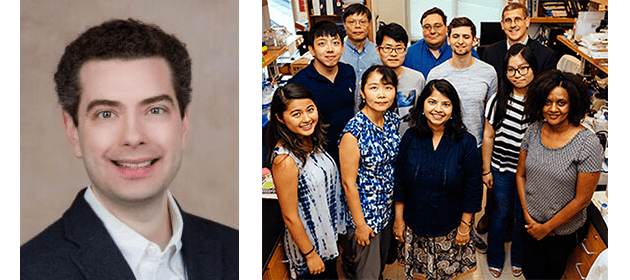Each month, the editors of The American Journal of Human Genetics interview an author of a recently published paper. This month, we check in with Thomas Wingo and Nicholas Seyfried to discuss their paper, “Genetic control of the human brain proteome”.

AJHG: What caused you to start working on this project?
TW: Nick and I have collaborated for a while, including work on personalized proteomics where we used exome or whole-genome sequencing to build personalized proteomic databases, so wanting to understand the factors that influence brain protein abundance naturally grew out of that collaboration.
AJHG: What about this paper most excites you?
TW: Despite the generally weak correlation between brain protein and mRNA levels, it is interesting that most of the pQTLs are also eQTLs but that most eQTLs were not found to be pQTLs. While there are some technical issues that are likely contributing to this observation, it also identifies sites that are likely acting at either the transcriptional, translational, and post-translational level.
NS: This is an exciting step to understanding the differences and complexity between RNA and protein levels in brain. Enhancing the depth and scale of proteomic datasets will further help address these questions in the future.
AJHG: Thinking about the bigger picture, what implications do you see from this work for the larger human genetics community?
TW: One of the more interesting possibilities is using these data to help identify post-transcriptional regulation of gene expression that would broaden our understanding of genomic sequences, i.e., primary DNA sequences, that are important in health and disease.
NS: This could potentially lead to a more tailored drug development for neurological diseases based on an individual’s genetic makeup.
AJHG: What advice do you have for trainees/young scientists?
TW: While much is known about the control of gene expression, there is even more that is unknown. There will be plenty of things left for them to discover but persistence is essential. Everyone is constantly learning and recovering from scientific and professional hurtles.
NS: Know that failure is part of learning and to always be persistent.
AJHG: And for fun, tell us something about your life outside of the lab.
TW: I enjoy playing Minecraft with my son.
NS: I enjoy playing Pocket City with my children and coaching my son and daughter’s basketball team.
Thomas Wingo, M.D., Ph.D is an associate professor in the Department of Neurology and Human Genetics and Emory University. Nicholas Seyfried, Ph.D. is an associate professor in the Department of Biochemistry and Neurology and the scientific director of the Emory Integrated Proteomics Core at Emory University.
